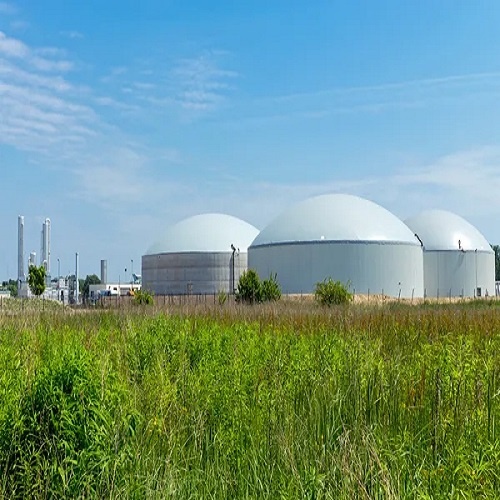Lucknow (Uttar Pradesh): In order to provide relief to people residing in Uttar Pradesh from pollution caused by stubble burning, the Yogi government is gearing up to produce Compressed Natural Gas (CNG) from stubble in the state, which will provide income as well as employment to a large number of people.
This effort will also lead to the production of pure organic fertilizer, contributing to the promotion of green energy and better health outcomes.
Chief Minister Yogi Adityanath released the Bio-Energy Policy 2022 to promote biofuel in UP and encourage large-scale investment in the sector. Many big investors had signed MoUs with the state government during the Global Investors Summit in this regard.
The state government has set a target to establish biogas plants in every tehsil, some of which will soon become operational.
One of the upcoming operational plants is Buland Biogas in Bulandshahr, situated in the Lauhgala tehsil. Buland Biogas had signed an MoU worth Rs 18.75 crore with the state government, the cost of which has now increased to Rs 21 crore.
This plant will commence production in December and is projected to yield 3 tonnes of CNG per day. This production will contribute to reducing the state’s dependence on petrol and diesel. Additionally, this initiative is expected to generate employment opportunities for 80 to 100 people, including both skilled and unskilled workers.
Athar Ahmed, owner of Buland Bio Gas, said that the plant produces not only straw but also degradable waste like straw, cow dung, chaff, sugarcane waste, municipal waste or a mixture of all the gases. With the help of this technology, CNG is purified. The license for this plant has been obtained from Indian Oil.
He said that the most noteworthy aspect of this project is the bulk production of organic fertilizer. All the waste generated during the compressed gas production process is 100 per cent organic, consisting of both solid and liquid components.
The liquid organic fertilizer produced by the plant will be distributed free of cost to farmers for a period of three years, with the identification of eligible farmers being the responsibility of the District Magistrate or CDO. This initiative aims to assist farmers who may face difficulties in purchasing fertilizers such as DAP and urea.
“The advantages of organic and liquid fertilizers are manifold. Traditional fertilizers form a dense layer on the soil, which takes time to reach the roots of trees and plants. In contrast, organic fertilizers can reach the roots within two to three hours, significantly enhancing their effectiveness. This not only benefits farmers but also makes organic products available to people, improving their overall health”, Athar Ahmed said.
He further mentioned that the Yogi government has propelled this project forward with remarkable speed, chiefly through the introduction of the Bio-Energy Policy 2022.
“This policy encompasses several provisions to facilitate the process. Firstly, it allows those who have obtained a LOI license to apply for it. Moreover, both the Central and State Governments are offering substantial subsidies, ranging from Rs 75 lakh to Rs 20 crore. Additionally, there is a 10-year exemption on surcharges for electricity, stamp duty, and land development charges. Apart from this, a discount of 50 plus 30 i.e. a total of 80 per cent is being given on machinery”, he informed.
Furthermore, arrangements are made for a consistent supply of raw materials, such as degradable waste. Long-term agreements have been established with sugar mills to procure sugarcane residue, and the Animal Husbandry Department has been tasked with inking agreements with all government-run cowsheds for the procurement of cow dung.
“Additionally, for projects with a value of Rs 50 crore or more, the government is extending support by providing a 5-kilometer approach road. To assist the investors the Yogi government has deployed Udyami Mitra. Every possible effort is being made by Bundalshahr’s Udyami Mitra Rajkumar to commence the plant as soon as possible”, Athar Ahmed added. (ANI)
(Inputs from ANI)












